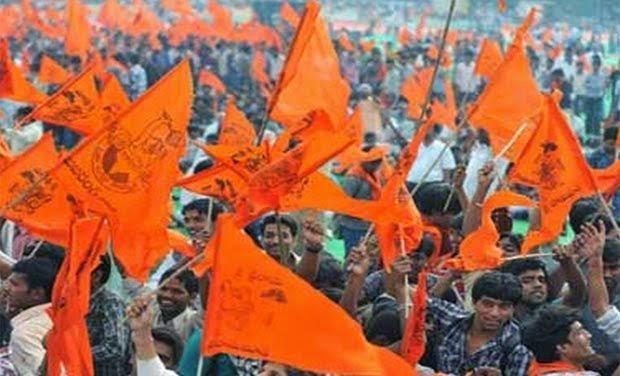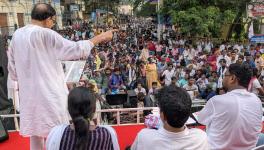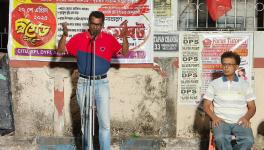Saffron Silence is Stifling Hindus in India and Globally

Ram Ram! Jai Sita Ram! Jai Shree Krishna! Namah Sivaya! Jai Bhole! Jai Shree Ram! Sriramar Thunai!
We hear and say these invocations of the Gods every day through our daily routines. All across India and the world, there is an ongoing thrum of bells, bhajans, chants, and pujas, as Hindus of all types and orientations call out to the sacred. Some are Advaitins, some are lovers of Ma, some are intoxicated by Sri Krishna, some are ecstatic with Bhole Baba – the rich diversity of our ways of praying and celebrating ring out into the skies and deep within our souls.
However, with over 1.5 billion Hindus globally, there are bound to be crooks and criminals. We have all seen stories of so-called "sadhus" (holy person) stealing, raping, robbing, and calling for genocide. No clergy in the world is immune to the presence of bad actors – and the fake charlatans who howl and yowl for genocide are sad creatures who require help. As politicians, they are practising what sells in India today- hate is a low-value, high-volume commodity with a ready market. To the extent they claim actually to be sadhus, we must feel terrible for them.
Having spent a fair amount of time with Mahatmas and sadhus of a wide range, I have few illusions about them. Like any other human being, they have their journeys to realising sat-chit-ananda (eternal consciousness bliss). In the Vaidic traditions, we are taught - and when lucky, realise personally - that the spiritual quest is the quest for infinite joy. This is a journey to abundance through renunciation, and the highway to this life is to actively engage in swadhyaya (self-inquiry). The principle of self-inquiry is that we see our desires - and realising that these desires are not who we are, we peel them away to make bliss and joy visible to us and the worlds around us.
As a reminder for friends who do not spend a lot of time with formal spiritual development, every tradition within the Hindu dharma has a wide range of variations. For all of us, Guru's teaching is primary. This incredible diversity makes it impossible to say with certainty that anyone action or practice is helpful or unhelpful. The Harishchandra story is an excellent example of actions that look terrible being a pathway to abundance and liberation.
Like Sri Ram, he, too, let go of his kingdom to preserve dharma. And Like Sri Ramachandra, he accepted the sorrow of separation from his family to live up to his duty. As he lives through loss and degradation in his integrity, his spiritual self shines through, and he is finally blessed with a good life and liberation. He leads the way with renunciation and sacrifice - he is not greedy and grasping like the pseudo-religious at the adharma sansads. At the same time, some broad patterns are common across varied sampradaya and maths (traditions and teaching organisations), etc. The basic guidance for many is to "let go of attachment to outcomes." The Bhagavad Gita (ch2, v 47) is very clear on this:
कर्मण्येवाधिकारस्ते मा फलेषु कदाचन।
मा कर्मफलहेतुर्भूर्मा ते सङ्गोऽस्त्वकर्मणि॥ २-४७
This verse roughly translates to:
“You have the right to work – not to its fruits (results).
Do not let desire be your motive, and don’t let inaction be your friend.”
While the first line of the verse is the more famous, both lines are significant. The first is clear – do your action without seeking the fruits of that action. So when we see hissing, spitting, silly sycophants spewing hate, one fundamental question arises: are they seeking an outcome? And the answer is yes – they are clearly seeking outcomes. For a real sadhu (not a politician pretending to be a renunciate), the fact that there is a desire for an outcome would be an immediate warning sign. It does not matter what the desired outcome is (even though, for many of us, calls for genocide are repugnant) – the desire for an outcome is a severe hindrance to our work of seeking freedom.
The next two lines are for the silent ones – those who need to speak up but stay quiet. Krishna clarifies his position: we must act without looking for personal success and eschew inaction. We cannot pretend that we are spiritual to avoid action— spiritual people act boldly and vividly – intending to help humanity and nature rather than for personal gain.
Spiritual people are not lazy and willing to act – even though the usual motivations for normal people are not part of their lives. We are driven by greed, lust, hunger, fear, touch, etc., – they are pulled by Seva and beauty, by love and the imperative to heal, by abundance and the need to free the universe from bondage and loss.
So why this stunning silence by the vast majority of India's sadhus and mahatmas? Most are genuine seekers, and some are enlightened and liberated beings. They disagree with these poor deluded politicians' petty greed and fearful screaming. But why do they not speak? Based on conversations and questions over the last five years, here are some explanations:
-
"This is just noise and obviously not a Hindu act."
-
"Everyone is part of my family; I cannot condemn anyone."
-
"People are angry, and we must be careful."
The concern is that in their silence, the Hindu dharma is getting tarnished by the loud calls to violence and strategic hatred of the greedy and fearful people - some of who may be genuine sadhus. They pretend to be renunciates – and as Hindus are, by and large, generous and loving people, many are willing to accept that their costumes are reality. For those who have cultivated their Viveka (ability to differentiate between the truth and lies,) we call on you to speak up – it is your dharma to help the rest of us who are struggling with the consequences of their hate.
Tulsidasji – in his beautiful and less popular Vinay Patrika – talks to his beloved Ram Bhagwan – and he complains how the different illusions and desires of the body and world drive him away from his search for truth (147:2-4)
"Mile rahaim, maryau cahaim kamadi samkghati, mo binu rahaim na, meriyai jaraim chala chati.
Basata hiye hita jani maim sabaki ruci pali, kiyo kathakako danda haum jara karama kucali.
Dekhi suni na aju laum apanayati aisi, karahim sabai sira mere hi phiri parai anaisi."
We call upon the real Mahatmas and sadhus/sadhvis of our time to act for us all -to speak the truth of what the Hindu dharma is loudly and lovingly, to inspire beauty and generosity, and to call for the joy of our interconnected, generous, and loving worlds.
Om – asato ma sat gamaya!
The writer is Co-founder, Hindus for Human Rights, USA. All views are personal.
Get the latest reports & analysis with people's perspective on Protests, movements & deep analytical videos, discussions of the current affairs in your Telegram app. Subscribe to NewsClick's Telegram channel & get Real-Time updates on stories, as they get published on our website.
























